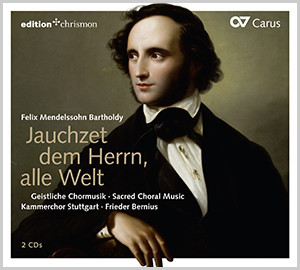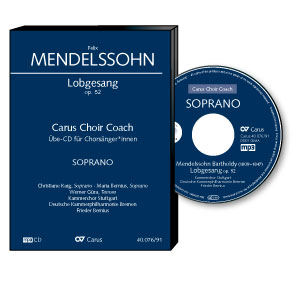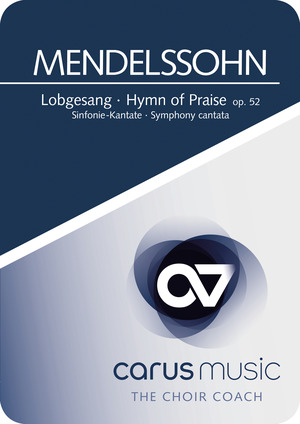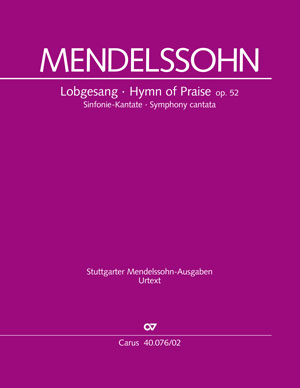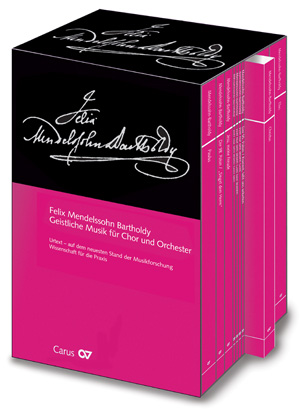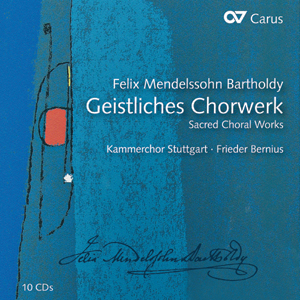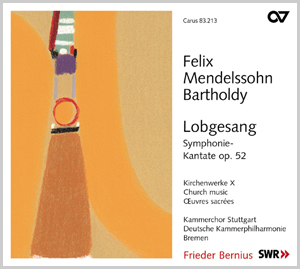
Contents
-
Composer
Felix Mendelssohn Bartholdy
| 1809-1847
-
Preface writer
R. Larry Todd
Prof. Dr. R. Larry Todd ist Arts & Sciences Professor of Music, Duke University, Durham. Bei Carus hat er zahlreiche Werke von Mendelssohn herausgegeben, darunter die Oratorien Elias, Paulus sowie Christus. Seine bei Carus in deutscher Sprache erschienene Mendelssohn-Biografie ist zumStandardwerk für Forschung und Mendelssohn-Fans geworden.
Personal details
-
Choir
Kammerchor Stuttgart
The Kammerchor Stuttgart is regarded as one of the best ensembles of its kind. Over its fifty-year existence, Frieder Bernius has developed the choir into an exceptional ensemble acclaimed by audiences and press alike. This has led to invitations for the choir to perform at all the important European festivals. In Germany the chamber choir performs at festivals and in concert halls in repertoire ranging from the 17th to the 21st century. Frieder Bernius and his ensemble have received numerous accolades for their contribution to new music. The Kammerchor Stuttgart has made over 80 CDs and LPs, numerous of which have been awarded international recording prizes (including the Edison award, Diapason d’or, Gramophone Choice, Classical Internet Award, International Classical Music Award, and German Record Critics’ Award prizes). The International Federation for Choral Music has invited the ensemble to sing at the 1st, 4th and 10th World Symposia on Choral Music in Vienna, Sydney and Seoul. Regular tours of North America and Asia since 1988 and a South America tour reflect the Kammerchor Stuttgart’s international reputation. Since 1984 the top ensemble has also been invited to Israel biennially. Personal details
-
Ensemble
Die Deutsche Kammerphilharmonie Bremen
The Deutsche Kammerphilharmonie Bremen is one of the world's leading orchestras, captivating audiences everywhere with its unique style of music-making. The Estonian conductor Paavo Järvi has been the orchestra's Artistic Director since 2004.
One of the many highlights of the collaboration with Paavo Järvi has been their Beethoven Project, on which conductor and orchestra concentrated for six years. Their Beethoven interpretations have been acclaimed worldwide by audiences and critics alike as benchmark performances. Following the Beethoven Project The Deutsche Kammerphilharmonie Bremen and Paavo Järvi focused on Robert Schumann's symphonic works with equal success.
The latest project of the orchestra and its conductor is the German composer Johannes Brahms. The first CD (Sony/RCA) of the project – Symphony No. 2, Tragic Ouverture and the Academic Festi-val Ouverture – was released in autumn 2017 and received the Opus Klassik in October 2018. The second CD, including Symphony No. 1 and the Haydn-Variations, followed in autumn 2018. With the third and fourth Symphony, released in March 2019, the symphony cycle has come to completion.
Highlight of the project was the internationally acclaimed performance of ›A German Requiem‹ on the 10th of April 2018 at Bremen Cathedral, 150 years after the first performance. The recording has now been released on DVD and Blu-ray by C-Major. In October 2019, ›The Brahms Code‹ – an excit-ing TV/DVD documentary about the Brahms Project produced by Deutsche Welle/Unitel – was re-leased and is the current German Record Critics' Award winner in the category music film (listed 1/20).
The Deutsche Kammerphilharmonie Bremen has been honoured with countless prizes such as Echo, Opus and Diapason d'Or for its recordings and the unique education project with the Gesamtschule Bremen-Ost in Osterholz-Tenever, the Zukunftslabor. For years, the orchestra has cultivated close musical friendships with international soloists such as Christian Tetzlaff, Maria João Pires, Janine Jansen, Igor Levit, Hilary Hahn and Martin Grubinger.
The Deutsche Kammerphilharmonie Bremen is permanent guest orchestra at the Elbphilharmonie Hamburg and Festival Orchestra of Kissinger Sommer. Personal details
-
Conductor
Frieder Bernius
| 1947Frieder Bernius’s work has earned great worldwide recognition. He is in demand internationally as a conductor and as a teacher. His principal artistic collaborators are the ensembles he founded himself, the Kammerchor Stuttgart, the Barockorchester Stuttgart, the Hofkapelle Stuttgart and the Klassische Philharmonie Stuttgart. As a guest conductor, he has collaborated repeatedly with, for example, the SWR Vokalensemble Stuttgart, the Deutsche Kammerphilharmonie Bremen, the Stuttgarter Kammerorchester and the Streicherakademie Bozen. Great stylistic versatility is Frieder Bernius’s hallmark. Whether he conducts vocal works by Monteverdi, Bach, Händel, Mozart, Beethoven, Fauré and Ligeti, stage music by Mendelssohn or symphonies by Haydn, Burgmüller and Schubert, his work always aims for a sound that is at once unmistakably personal and at the same time oriented towards the original period sound ideal. He devotes himself equally to the rediscovery of 18th century operas and to first performances of contemporary compositions. He is particularly interested in the musical history of southwestern Germany. Carus-Verlag has awarded Frieder Bernius a Golden CD for his complete recording of the sacred music of Felix Mendelssohn Bartholdy. The award was presented to him during the German Choir Festival in Stuttgart 2016. The sale of over 250,000 recordings, which has been acclaimed with a number of awards, has made a not insignificant contribution to what today is the obvious presence of Mendelssohn's complete œuvre in the concert repertoire. Personal details
-
Soloist - soprano
Maria Bernius
-
Soloist - soprano
Christiane Karg
Christiane Karg studied at the Mozarteum Salzburg. She was awarded the Lilli Lehmann Medal of the International Mozarteum Foundation for her final diploma. As well as lieder recitals at the Heidelberger Frühling and Schleswig-Holstein music festivals, she has sung in opera at the Salzburg Festival, Theater an der Wien and Komische Oper Berlin. For the 2008/09 season, she has moved from the International Opera Studio at the Hamburg State Opera, which she joined in 2007, to join the company at the Frankfurt Opera. Christiane Karg has won prizes at several international singing competitions. In 2008 she was awarded a prize for the most promising artist by the Walter and Charlotte Hamel Foundation. Personal details
-
Soloist - tenor
Werner Güra
Werner Güra studied at the Salzburg Mozarteum. He continued his vocal training with Kurt Widmer in Basle and Margreet Honig in Amsterdam. He has appeared as a guest singer in operas in Frankfurt, Basle, Dresden, Paris and Brussels, and has sung regularly at the Staatsoper in Berlin since 1999. As a concert and oratorio singer he frequently appears with leading orchestras and renowned conductors. He has made a number of tours to Japan. Werner Güra also has a reputation as a Lied interpreter, which is reflected in concerts for international promoters and in his numerous recordings, which have won prestigious awards like the “Diapason d’Or.” Personal details
Reviews
Ob einfache, kurze Stücke wie der Abendsegen "Herr, sei gnädig" (auf der siebten CD) oder das große "Elias'-Oratorium: Mendelssohns melodischer Erfindungsreichtum berührt fast immer und unmittelbar. Allen Formaten erweist der musikalische Regisseur Bernius gemessene Reverenz, leuchtet die subtilen Klanggeflechte sorgfältig aus. Strahlender und gleichzeitig uneitler ist diese Musik kaum darstellbar.
www.spiegel.de, 1.4.09
Bernius geht es, ... um schlanken, transparenten Klang, eine aufgelockerte Textur, zügige Tempi und eine klare Artikulation - zum Beispiel in der Einleitung zum Schlusschor mit ihren scharf abgerissenen Streicherakkorden, die man so impulsiv wohl kaum je gehört hat.
Andreas Friesenhagenm Fono Forum, 05/09
Ergreifend gestaltet sind auch die Ausrufe des Tenors "Hüter, ist die Nacht bald hin?", wie es Bernius überhaupt gelingt, bis hin zum kollektiven Gotteslob im Finale die vokalen und instrumentalen Schichten dramaturgisch schlüssig zusammenzufügen. In der Deutschen Kammerphilharmonie Bremen, dem Stuttgarter Kammerchor und dem Tenor Werner Güra hat Frieder Bernius dabei technisch brillante Partner. [...]
Stuttgarter Zeitung, Juni 2009
Diese Einspielung kann zukünftig als Referenzaufnahme verstanden werden und ist deshalb gerade im Mendelssohn-Jahr sehr zu empfehlen.
Kai Schmidt, Musikforum, 3/2009
Die bei Carus erschienene CD macht deutlich, wie aufregend dieses Werk klingen kann.
Frank Pommer, Die Rheinpfalz, 1. Juli 2010
Frequent questions about this work
 There are no questions and answers available so far or you were unable to find an answer to your specific question about this work? Then click here and send your specific questions to our Customer Services!
There are no questions and answers available so far or you were unable to find an answer to your specific question about this work? Then click here and send your specific questions to our Customer Services!


